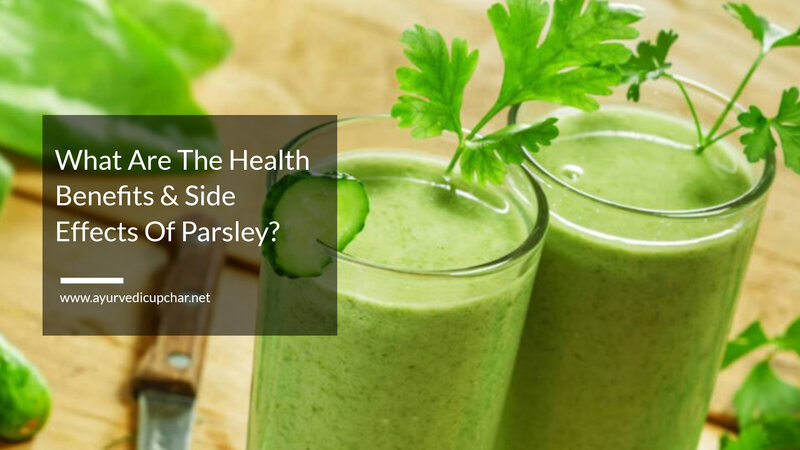What Are The Health Benefits & Side Effects Of Parsley?
 Parsley is a plant whose properties provide us with innumerable health benefits. Let’s focus on how you can help us. Parsley is a Mediterranean herb that adds a touch of color to our dishes.
Parsley is a plant whose properties provide us with innumerable health benefits. Let’s focus on how you can help us. Parsley is a Mediterranean herb that adds a touch of color to our dishes.
But let’s not think it’s just a side dish – parsley has been around for over 2,000 years, after all, and has some proven benefits that we need to know about.
A surprisingly small amount of parsley is packed with vitamins. Just two tablespoons provide two percent of the daily needs for calcium, iron, and folic acid, 12 percent for vitamin A, more than 150 percent for vitamin K, and 16 percent for vitamin C.
1. Improve nutrition
The vitamin K in parsley supports bone health, while the richness of vitamin C makes it a great immune booster. Parsley is an excellent source of beta-carotene, an antioxidant that can help protect the body against free radical damage and fight the effects of aging.[1]
2. Kidney stone prevention
There is evidence that parsley can support healthy kidney function. While the herb contains oxalates, which can cause problems for people with existing kidney problems, a study published in the Journal of Urology found that ingesting parsley leaves and roots reduced the amount of calcium oxalate deposits in animals. The researchers found that ingesting parsley helped break down kidney stones in the animals.[2]
3. Joint pain relief
Using parsley daily will make us feel relief from joint pain. That is because this herb has anti-inflammatory properties.[3]
4. Against fatigue
Because it is rich in iron, parsley is recommended for patients with anemia, as this study shows. Two tablespoons of parsley provide two percent of your daily iron amounts, so a pinch of parsley adds some punch to any food.[4]
5. Fight against cancer
Parsley is rich in cancer-fighting compounds. Early studies suggest that compounds in parsley may even inhibit tumor growth. A recent study in the Journal of the Science of Food and Agriculture found that parsley has powerful anti-cancer properties.
It actually fights cancer in 4 different ways: it acts as an antioxidant that destroys free radicals before damaging cells, protects DNA from damage that can lead to cancer or other diseases, and inhibits the proliferation and migration of cancer cells in the body.[5]
6. Prevention and treatment of diabetes
Research published in the Journal of Nutrition found that eating foods rich in a natural nutrient known as myricetin can lower the risk of developing type 2 diabetes by 26 percent. Parsley is one of the best sources of myricetin, containing approximately 8 milligrams per 100 grams of parsley.[6]
What are the benefits of eating parsley every day?
- Prevents cancer because it activates glutathione, a powerful antioxidant in the body.
- Prevents Flu prevents premature aging as it is rich in antioxidants such as essential oils, vitamin C, and flavonoids, especially luteolin.
- Strengthens the immune system, as it is rich in vitamin C and contains antibacterial properties.
- It prevents anemia because it is rich in iron and folic acid.
- Combats fluid retention due to its diuretic properties.
- Prevents and fights kidney stones by stimulating the elimination of fluids and helping to cleanse the kidneys.
- It prevents heart diseases such as atherosclerosis, as it is rich in antioxidants.
- It prevents thrombosis and strokes, due to the fact that it prevents the formation of blood clots.
- Improves skin health due to its high amount of antioxidants.
- Improves digestion due to its fiber content.
- Controls hypertension by being a diuretic.
- It fights urinary infections due to its antibacterial and diuretic action.
To use it in culinary preparations, you should choose fresh parsley that has very green and firm leaves, or pure dehydrated parsley that is preferably organic, since in this way it provides more health benefits.
Nutritional composition
The table below indicates the nutritional information on 100 g of parsley:
Nutritional composition for 100 g of raw parsley
- Energy 33 kcal
- Carbohydrates 5.7 g
- Protein 3.3 g
- Fats 0.6 g
- Fibers 1.9 g
- Calcium 179 mg
- Magnesium 21 mg
- Iron 3.2 mg
- Zinc 1.3 mg
- Vitamin C 51.7 mg
The best way to make fresh parsley last longer is to wash it just before using it since wet leaves in the fridge tend to darken and rot faster.
Another suggestion is to keep the fresh parsley in the refrigerator in a closed container. To make the leaves last longer, you can place a napkin or a sheet of absorbent paper on the parsley, so that it absorbs moisture and maintains the freshness of the leaves for longer.
Parsley tea for the kidneys
Parsley tea can be used to help fight urinary infections, and kidney stones, to control hypertension and fluid retention.
Ingredients
1 teaspoon of dried parsley or 3 tablespoons of fresh parsley
250 ml of boiling water.
Preparation mode
Add the parsley to the boiling water, cover, and steep for 10 minutes. Strain and drink up to a maximum of 3 cups per day. It is important to remember that this tea is contraindicated in pregnant women.
Green Parsley Juice for the skin
The green juice made with parsley is rich in antioxidants that help keep the skin young and healthy, fighting fluid retention, and helping in weight loss diets.
Ingredients
1/2 cup of parsley
1 orange
1/2 apple
1/2 cucumber
1 glass of coconut water.
Preparation mode
Blend all the ingredients and drink without adding sugar and without straining.
Contraindications
Parsley should not be consumed by people with severe kidney problems, such as acute or chronic kidney failure, nephrotic or nephritic syndrome, for example; or who are in the postoperative period of surgery (less than 1 month).
In addition to this, tea or juice should be avoided by pregnant or breastfeeding women, because it is not known what effects it could have on the development of the baby or on breastfeeding.























